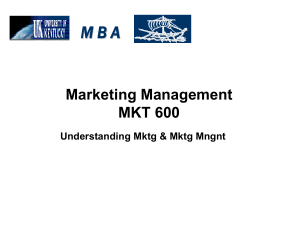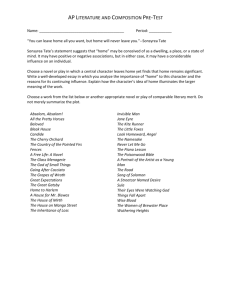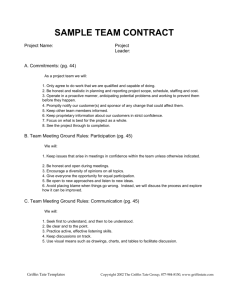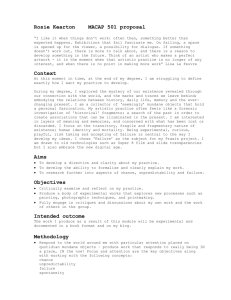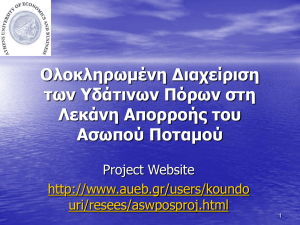ΠΑΡΑΔΕΙΓΜΑ ΤΟΥ 2 ου ΣΤΑΔΙΟΥ The Cold War
advertisement
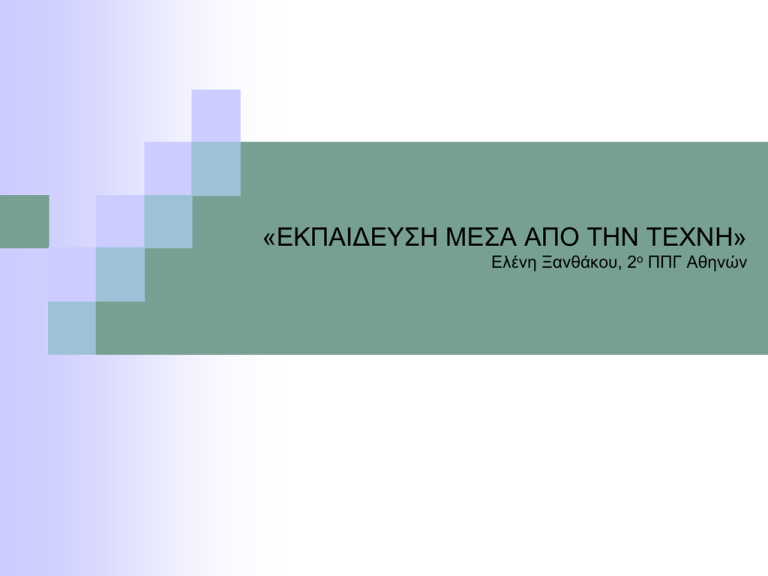
«ΕΚΠΑΙΔΕΥΣΗ ΜΕΣΑ ΑΠΟ ΤΗΝ ΤΕΧΝΗ» Ελένη Ξανθάκου, 2ο ΠΠΓ Αθηνών Στάδια της μεθόδου Στάδιο 1: Προσδιορισμός της ανάγκης για κριτική διερεύνηση ενός θέματος «Οι συνέπειες του πολέμου/ The Consequences of War» Στάδιο 2: Οι εκπαιδευόμενοι καταγράφουν τις απόψεις τους (ΓΡΑΠΤΑ) επάνω σε ένα θέμα, υπό τη μορφή μικρής εργασίας: Η καταγραφή αυτή σκόπιμο είναι να απαντά σε ένα ανοικτό ερώτημα: «Τι σκεφτόσαστε για τις συνέπειες του πολέμου; / What comes to mind when thinking about the consequences of War?» Η δραστηριότητα γίνεται σε μικρές ομάδες τριών ή τεσσάρων ατόμων (6 ομάδες τεσσάρων ατόμων και μία τριών ατόμων)/ The activity is intended for 7 groups of 3-4 students. Γ2 groups Group 1 Group 2 Group 3 Group 4 Group 5 Group 6 Group 7 The Cold War WW 2 The Nazi Trojan War The North & the South The Navarino Naval warfare WW 1 Eleana K., Katerina Th, Stavros K. Apostolis K. Teodora K., Bartek Z., Antonis D., Maria K. Mikele K., Paris K., Theodora K., George E. Kon/os K., Thania K., Vaggelis K., Dimitris K. Argyro K., Elli K., Panayiotis K., Christos K. Niki K., Dimitra K., Natalia K., Denisa L. George K., Areti K., Eleni K. ΠΑΡΑΔΕΙΓΜΑ ΤΟΥ 2ου ΣΤΑΔΙΟΥ The North & the South ‘What comes to mind when thinking about the consequences of War? Many people die We have environmental destruction Many cities are destroyed Living standards are low There is a cultural crisis Future generations have to face war consequences Winner country has domination over other countries Psychological consequences to people who survive wars Because Some need to expand borders Some need to defend their country from an invasion Countries want to dominate others Countries want to take revenge ΠΑΡΑΔΕΙΓΜΑ ΤΟΥ 2ου ΣΤΑΔΙΟΥ The Trojan war ‘What comes to mind when thinking about the consequences of War? There are a lot of victims Many children die War harms the national economy Many families are destroyed The populations are mixed and many children are left without parents When the war ends there are no jobs for people to live by Many cities are destroyed Because Many countries want to boost their wealth through the wealth of other countries Some countries want to expand their territory Some leaders do it fun Some countries do it for revenge ΠΑΡΑΔΕΙΓΜΑ ΤΟΥ 2ου ΣΤΑΔΙΟΥ WW 2 ‘What comes to mind when thinking about the consequences of War? The destructive consequences of war are many. First of all, during the war many people die which is the cause of the reduction of the world population. Also, the environment is being destroyed by the army weapons which are harmful for the nature. Furthermore, the economy of many countries is severely damaged. In the end, many people become homeless, and they do not have food and water to survive. So, war is really bad for the development of the country. People engage in wars because they want to expand their borders. Another reason is that they want to save themselves from their enemies. ΠΑΡΑΔΕΙΓΜΑ ΤΟΥ 2ου ΣΤΑΔΙΟΥ The Cold War ‘What comes to mind when thinking about the consequences of War? Population is reduced The cities are destroyed The relationships between countries are damaged Economy is weakened The environment gets polluted Generations are vanished Whole nations are lost forever Birth rates face problems Because Counties want to use other countries’ internal wealth There are religious issues Countries want to expand ΠΑΡΑΔΕΙΓΜΑ ΤΟΥ 2ου ΣΤΑΔΙΟΥ The Navarino naval warfare ‘What comes to mind when thinking about the consequences of War? Nowadays, despite the vanity of war, there are wars happening with bad consequences. You do not gain anything when you go to war. On the contrary you cause your life a lot of worries. There are casualties and victims and many cities are destroyed along with their beautiful sights. Moreover, nature and the environment are destroyed . Many children stay alone without parents. Bad people rob parents of their money and cause them to die. War causes many psychological problems and you cannot live your life the way you want. People go to war to save their country, for their religion, to take revenge, for economic reasons, due to racism & because of commerce. Sometimes people are bribed to go to war. ΠΑΡΑΔΕΙΓΜΑ ΤΟΥ 2ου ΣΤΑΔΙΟΥ WW 1 ‘What comes to mind when thinking about the consequences of War? People die There is a detrimental effect on the economy Towns, cities and the environment are devastated Art is eliminated Hatred among people dominates Nations are split There is widespread poverty and hunger Illnesses cannot be treated medically so they spread everywhere After a war, everything gets balanced and peace returns Nations are renewed Because Nations want to expand so they conquer foreign land Political, civilization, religious differences A country intends to gain another country’s internal wealth ΠΑΡΑΔΕΙΓΜΑ ΤΟΥ 2ου ΣΤΑΔΙΟΥ The Nazi ‘What comes to mind when thinking about the consequences of War? A big amount of the population is dead Reduction of population Poverty Hunger Destruction of the economy Cities are destroyed Fear is spread through the people People lose their homes and become refugees Many times there are civil wars within a nation after a war Nations are split Remarkable works of art are destroyed Illnesses are spread Because Authorized people/Officials see advantages of war differently from common people Racism Religious matters There is need to gain power There is need to expand a nation Financial reasons Στάδιο 3: Προσδιορισμός: α)των υποθεμάτων που θα εξεταστούν και β) των κριτικών ερωτημάτων επάνω στα υποθέματα Υποθέματα: α. Πως θα σχολιάζατε την αναγκαιότητα του πολέμου;/ What do you think about the pervasive nature of war? β. Ποιοι είναι οι πιθανοί τρόποι επίλυσης διαφορών; / How can problems be resolved? Κριτικά ερωτήματα: α. Γιατί οι άνθρωποι κάνουν πολέμους; / Why do people engage in wars? β. Πιστεύετε ότι η κυριαρχία είναι η ύστατη λύση; / Do you think dominance is the ultimate solution? Στάδιο 4: α)Επιλογή των έργων τέχνης β)Συσχέτιση των έργων με τα κριτικά ερωτήματα Επιλέγονται τα ακόλουθα έργα Τέχνης ως εναύσματα για να συζητηθούν τα κριτικά ερωτήματα. Το νόημα των έργων τέχνης συσχετίζεται με το περιεχόμενο των κριτικών ερωτημάτων: Δημιουργείται ένας πίνακας συσχέτισης. Mark Gertler Merry-Go-Round http://www.tate.org.uk/art/artworks/gertler-merry-go-round-t03846 Artist: Mark Gertler 1891–1939 Title: Merry-Go-Round Date: 1916 Medium Oil paint on canvas Dimensions Support: 1892 x 1422 mm frame: 2100 x 1620 x 75 mm Collection :Tate Acquisition Purchased :1984 Reference: T03846 Christopher Richard Wynne Nevinson La Mitrailleuse http://www.tate.org.uk/art/artworks/nevinson-la-mitrailleuse-n03177 Artist: Christopher Richard Wynne Nevinson 1889–1946 Title: La Mitrailleuse Date: 1915 Medium Oil paint on canvas Dimensions Support: 610 x 508 mm frame: 777 x 670 x 90 mm Collection: Tate Acquisition Presented by the Contemporary Art Society 1917 Reference: N03177 Sir William Orpen Zonnebeke http://www.tate.org.uk/art/artworks/orpen-zonnebeke-t07694 Artist: Sir William Orpen 1878–1931 Title: Zonnebeke Date: 1918 Medium Oil paint on canvas Dimensions Support: 635 x 762 mm frame: 820 x 953 x 75 mm Collection: Tate Acquisition Presented by Diana Olivier 2001 Reference: T07694 James Boswell The Fall of London: The Horseguard http://www.tate.org.uk/art/artworks/boswell-the-fall-of-london-the-horseguard-p11655 Artist: James Boswell 1906–1971 Title: The Fall of London: The Horseguard Date1933 Medium Lithograph on paper Dimensions Image: 133 x 95 mm Collection: Tate Acquisition Presented by Ruth Boswell, the artist's widow 2000 Reference: P11655 Tracey Emin Hate and Power Can be a Terrible Thing http://www.tate.org.uk/art/artworks/emin-hate-and-power-can-be-a-terrible-thing-t11891 Artist: Tracey Emin born 1963 Title: Hate and Power Can be a Terrible Thing Date: 2004 Medium Textiles Dimensions Object: 2700 x 2060 x 3 mm Collection: Tate Acquisition Purchased : 2004 Reference: T11891 George Stubbs Horse Attacked by a Lion http://www.tate.org.uk/art/artworks/stubbs-horse-attacked-by-a-lion-t01192 Artist : George Stubbs 1724–1806 Title: Horse Attacked by a Lion Date1769 Medium Enamel on copper Dimensions Support: 241 x 283 mm frame: 514 x 560 x 74 mm Collection: Tate Acquisition Purchased with assistance from the Friends of the Tate Gallery 1970 Reference: T01192 Jake Chapman & Dinos Chapman Disasters of War http://www.tate.org.uk/art/artworks/chapman-disasters-of-war-t07454 Artist: Jake Chapman born 1966 Dinos Chapman born 1962 Title: Disasters of War Date: 1993 Medium Plastic, polyester resin, synthetic fibres, wood and guitar strings Dimensions Displayed: 1300 x 2000 x 2000 mm Collection: Tate Acquisition Purchased 1998 Reference: T07454 Πίνακας συσχέτισης έργων Τέχνης - Κριτικών ερωτημάτων ΕΡΓΟ ΚΑΛΛΙΤΕΧΝΗΣ α Κριτικό Ερώτημα β Κριτικό Ερώτημα Merry-Go-Round Mark Gertler * * La Mitrailleuse Christopher Richard Wynne Nevinson * * Zonnebeke Sir William Orpen * * The Fall of London: The Horseguard James Boswell * * Hate and Power Can be a Terrible Thing Tracey Emin * * Horse Attacked by a Lion George Stubbs * * Disasters of War Jake Chapman & Dinos Chapman * * Στάδιο 5: α) Επεξεργασία των έργων τέχνης β) Συσχέτιση της επεξεργασίας αυτής με τα κριτικά ερωτήματα Στάδιο 5α: Γίνεται επεξεργασία δύο έργων τέχνης που επιλέγονται από τους μαθητές. Χρησιμοποιούνται εναλλακτικά οι τεχνικές: - Οι τέσσερις φάσεις της τεχνικής του D. Perkins - H τεχνική “Visible Thinking” ΤΟ ΚΡΙΤΙΚΟ ΕΡΩΤΗΜΑ : α. Γιατί οι άνθρωποι κάνουν πολέμους; / Why do people engage in wars? Mark Gertler Merry-Go-Round http://www.tate.org.uk/art/artworks/gert ler-merry-go-round-t03846 ΤΟ ΚΡΙΤΙΚΟ ΕΡΩΤΗΜΑ: β. Πιστεύετε ότι η κυριαρχία είναι η ύστατη λύση; / Do you think dominance is the ultimate solution? James Boswell The Fall of London: The Horseguard http://www.tate.org.uk/art/artworks/boswellthe-fall-of-london-the-horseguard-p11655 Τεχνική Επεξεργασίας Τεχνική : D. Perkins Τεχνική: Visible Thinking Τεχνική προσέγγισης Mark Gertler Merry-Go-Round James Boswell The Fall of London: The Horseguard Τεχνική : D. Perkins Look at the painting. Express what you see. Formulate questions. (T writes everything that comes up/ No interpretation.) Look more attentively. Express what makes an impression on you (Expression). How do you explain possible surprises you have encountered? (Interpretation) Τεχνική: Visible Thinking What do you see? What is going on? What makes you draw the conclusions you make? What makes you wonder? What seems to worry you? Στάδιο 5β (η εργασία γίνεται στις αρχικές ομάδες): Όλες οι ιδέες που προκύπτουν στο στάδιο 5α συσχετίζονται με τα κριτικά ερωτήματα. Στο τέλος της διαδικασίας του 5ου Σταδίου, οι απόψεις των εκπαιδευομένων για το θέμα αναμένεται να έχουν εμπλουτιστεί πολύ, με κριτικό και δημιουργικό τρόπο. Στάδιο 6: Κριτικός Αναστοχασμός Οι εκπαιδευόμενοι γράφουν την ίδια μικρή εργασία που εκπόνησαν στο 2ο Στάδιο στις ίδιες ομάδες. Γίνεται σύνθεση και αντλούνται συμπεράσματα. Η εφαρμογή της μεθόδου αναμένεται να ευαισθητοποιήσει τους μαθητές και να τους καταστήσει κριτικούς παρατηρητές της κοινωνικής πραγματικότητας. Ελένη Ξανθάκου 2ο ΠΠ Γυμνάσιο Αθήνας, 17/3/2015
